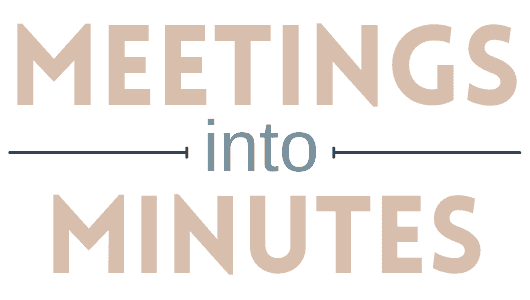After reading about the Commonwealth Bank and their record-keeping ordeal, it has come as a timely reminder of why accurate minute taking is of high importance. No matter how big or small your organisation is, ensuring your records are kept accurate is the best way to ensure you stay compliant. Too many times have we seen businesses not handle their minute-taking procedures correctly.
But, how can this be fixed? Accurate minutes is one of the best ways to ensure your business follows correct procedure and legally stays compliant.
Why should a business keep minutes?
Aside from ensuring your business stays compliant, minutes are an important part of every day matters in business. Minutes are an official record of what happens at meetings and throughout the operation of the organisation.
They also keep your staff accountable. When it comes to meetings, there are going to be times when certain decisions are forgotten about or missed. This is where the minutes come into effect. Minutes are often provided after meetings to everyone involved. This is an accurate way to keep personnel informed about the decisions made and who is responsible.
If any questions arise after a meeting or in the future, the minutes can be used to refer back to and understand exactly what happened during a meeting.
Minutes are a legal document
When an organisation comes under investigation, your meeting minutes serve as a legal document. If you are sued by another party, the minutes are also used during the proceedings. This is yet another reason why your minutes need to be accurate. Keeping accurate minutes can save your organisation if you know you have done everything correctly. Your minutes will be your solid evidence to prove that you have been compliant in every way possible.
How can I keep accurate minutes?
Understanding how to take minutes of a meeting is your first step. Unfortunately, it’s not as simple as writing down important decisions. Often, there is an agenda to follow, items to discuss and decisions to be made. Depending on your organisation and meeting type, you may also have to note down the results of any votes that are conducted.
How can I learn how to take minutes?
There are a number of short courses to help you to learn how to take minutes for a meeting. A course may help you or your staff learn what is involved with taking minutes, what should and shouldn’t be noted and how to ensure they stay accurate. Taking minutes is a skill. Understanding the complexities of minute-taking can help you to hone this skill and ensure your minutes stay compliant (because after all, the minutes are a legally binding document, so must be treated as so).
No time to learn? Call in the experts.
If you don’t have time to take a short course in minute-taking or you don’t want to train your staff, there’s another option. There are businesses who can handle all of your minute-taking needs. Not only can you guarantee that you’ll receive high-quality minutes, but you can also rest easy knowing you’re receiving accurate, professional and compliant results.
Calling in an outsourced business to handle your minute-taking also removes any potential personal bias that may occur when someone from your organisation handles the minute-taking.
If you’re looking for a minute taker in Sydney and surrounds, contact Meetings into Minutes. We can attend a one-off meeting or scheduled, regular meetings. No matter what organisation you are running, we’re here to help. Contact us today to discuss your needs.





